SPECIAL
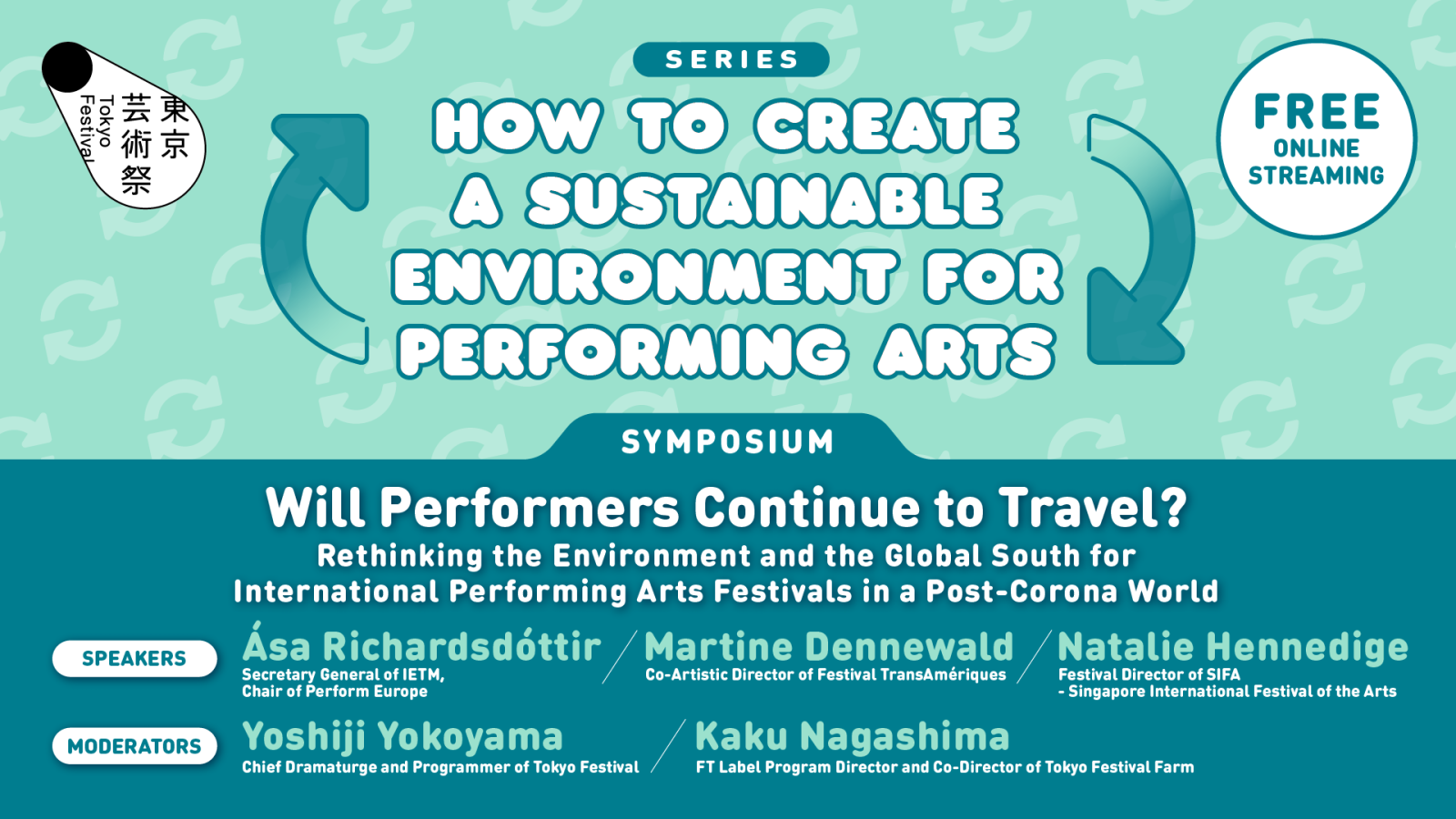
Report on Tokyo Festival 2022 Symposium “Will Performers Continue to Travel? Rethinking the Environment and the Global South for International Performing Arts Festivals in a Post-Corona World” (Series – How to Create a Sustainable Environment for Performing Arts)
Original Text: Symposium Production Team
English Translation: Christopher Gregory
This symposium was held as part of the How to Create a Sustainable Environment for Performing Arts series that has been run by Tokyo Festival since 2020. The series began as a response to the Covid-19 pandemic, and, as its name suggests, it has a strong undercurrent of awareness of sustainable development goals.
The theme of this symposium is readily apparent from its title. In essence, it asks whether or not people involved in the performing arts should continue to cross international borders in order to create and present work, given how the post-Covid world has created (and continues to create) significant restrictions on domestic and international mobility, as well as the environmental problems caused by CO2 emissions from air travel that have been an issue since before the Covid-19 pandemic. Although pandemic-related restrictions on mobility are now easing significantly in many regions around the world, environmental issues persist as a limit that cannot be ignored, prompting our continued self-reflection on this issue.
In the world of the performing arts, French choreographer Jérôme Bel drew attention with his 2019 announcement that he would no longer travel by plane to create work or to go on tour. He appears to be exploring alternatives like either traveling by trains instead of planes whenever possible, or by presenting ideas and concepts to local collaborators who implement those ideas to create pieces themselves, without Bel traveling there himself. It may at first glance appear that there is no room to argue with Bel’s decision, because no issue could be more significant for the future of the planet than protecting the environment. However, in reality, not just anyone can make that decision so simply. Or, rather, it’s not a simple choice for anyone, but the difficulty of carrying it out is not evenly distributed. The pain created by boycotting air travel differs widely between Europe, where cultural capital is concentrated and robust rail infrastructure exists, and the rest of the world. Precisely because no one on earth can escape the environmental crisis, it is impossible to detach these issues from questions of the relative positions of who is speaking about them and who must bear the cost. The inclusion of the Global South in this symposium’s title is one expression of awareness of this issue.
After moderator Yoshiji Yokoyama (Chief Dramaturge and Programmer of Tokyo Festival) gave a broad overview of the issues discussed above in his introduction, each of the three invited panelists gave their own presentations.
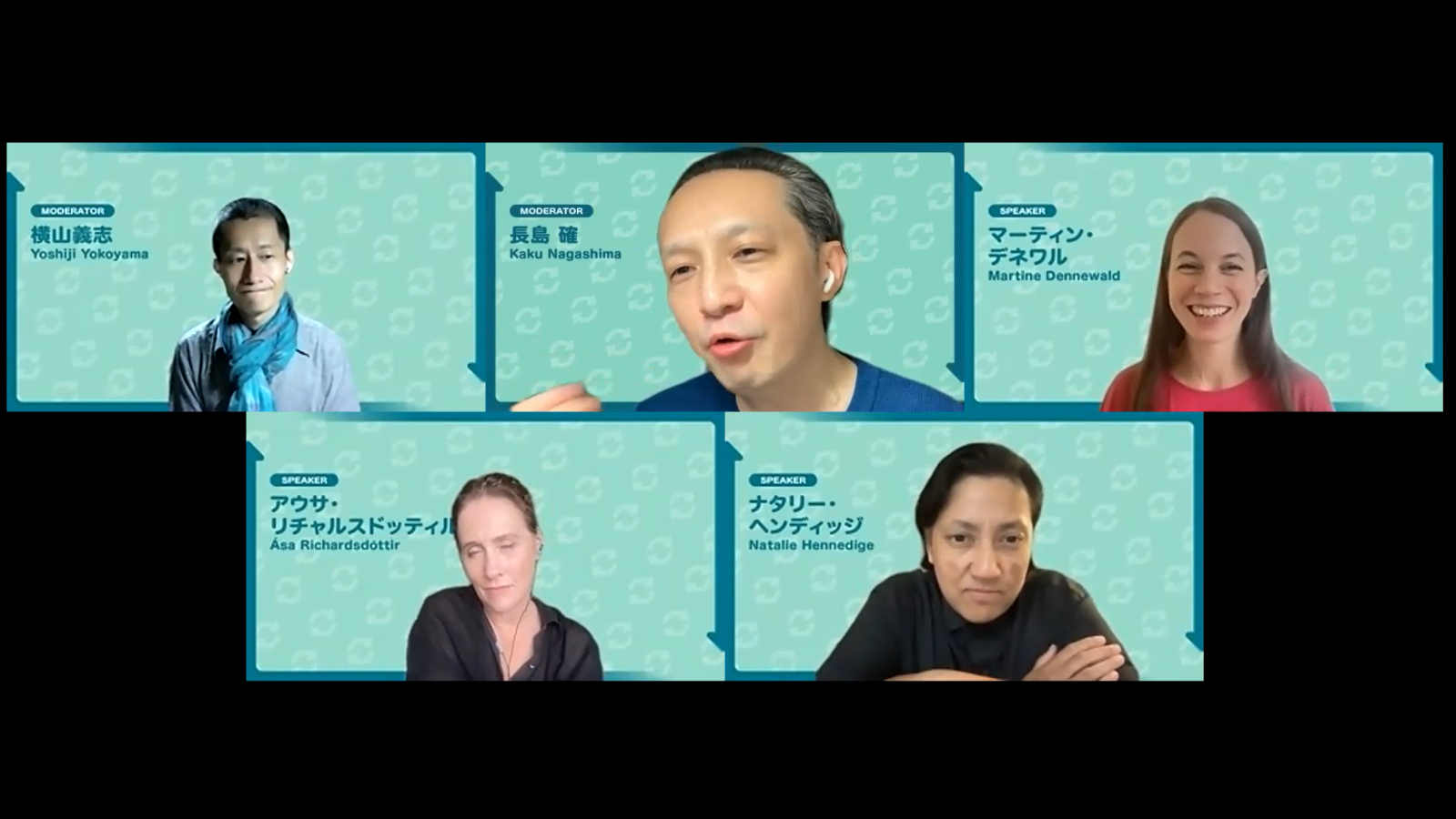
The first speaker was Ása Richardsdóttir. Richardsdóttir is the Secretary General of IETM (International Network for Contemporary Performing Arts), a network composed of over 500 organizations and individuals working in the performing arts from around the world, and she also serves as the Chair of Perform Europe.
Perform Europe is a project that aims “to rethink cross-border performing arts presentation in a more inclusive, sustainable and balanced way” that is led by a consortium of 5 organizations: IETM, The European Festival Association (EFA), Circostrada: European Network for Circus and Street Arts, European Dancehouse Network (EDN), and research partner IDEA Consult. It is supported by the EU’s Creative Europe cultural support program and involves artists from 41 countries, made up of the 40 countries of Creative Europe and also the UK.
Richardsdóttir’s presentation provided an overview of the research conducted by Perform Europe about international performances in Europe, and it introduced a number of Perform Europe’s policy proposals for the EU, with a particular emphasis on issues related to green transition. She pointed out that there are disparities in the ability to tour and the resources available to do so even within Europe, and across Europe there is a dearth of programs available to support green mobility and green practices. So, ecological practices can have an extremely high cost, placing an economic burden on those who attempt to implement them. She stated that, going forward, what must be done is to respect both the boundaries of the environment and the human capacities of all involved while establishing new funding schemes—specifically, funding schemes that explicitly provide additional budgets for greening practices, prioritizing green transitioning and acknowledging the potential of reductions in scale, pace, and output. At the same time, Richardsdóttir gave the caveat that, because there are significant disparities between countries and regions in the level of economic development and local political priorities, it is not reasonable to expect everyone in every region to immediately put this into practice to the same degree. She concluded the presentation by emphasizing “solidarity practices” as being key to taking these diverse realities into account.
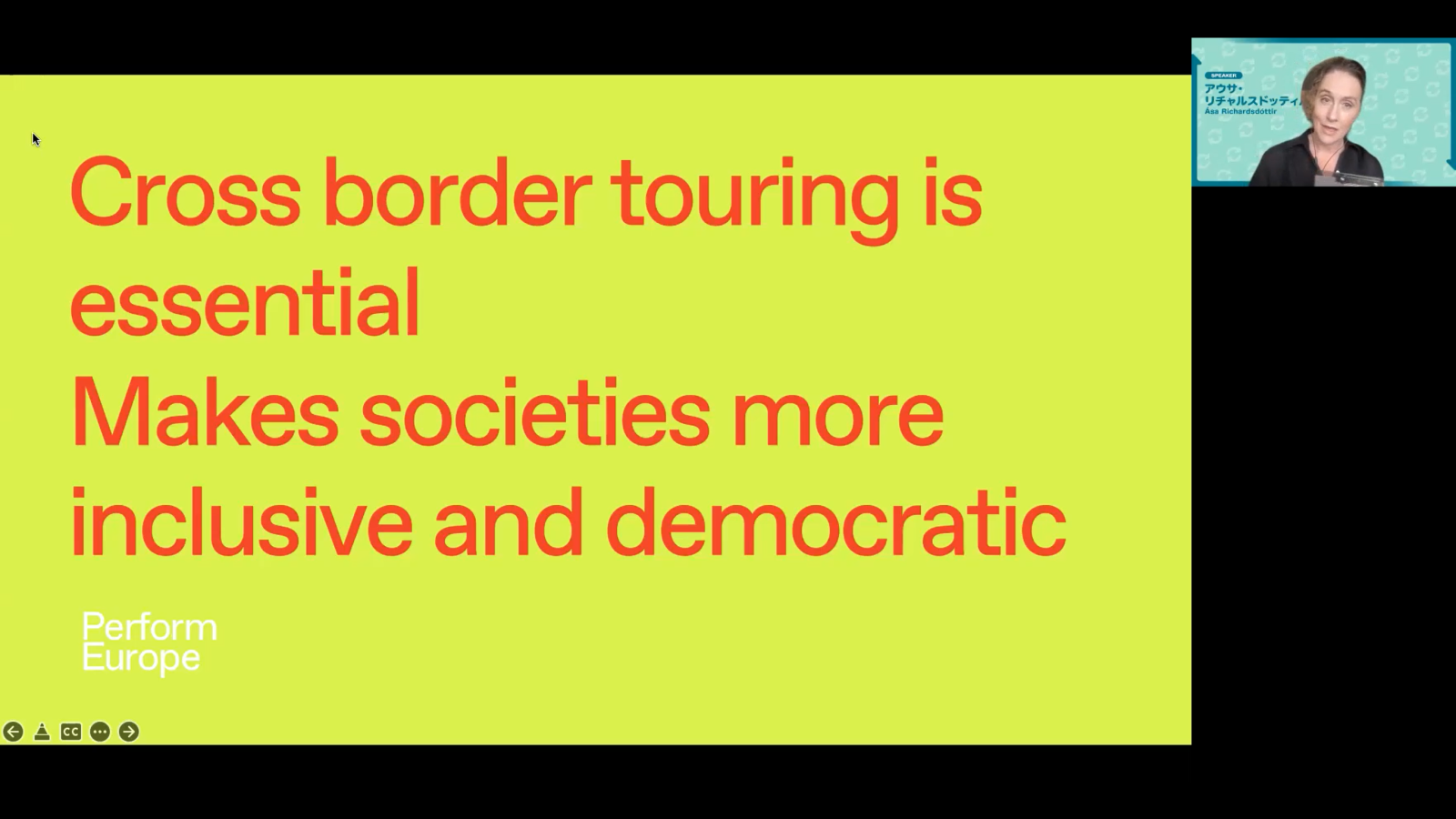
The second speaker, Martine Dennewald, serves alongside Jessie Mill as the Co-Artistic Director of Montreal’s Festival TransAmériques. Dennewald’s presentation began with a land acknowledgement, which she described as being an important part of the work they do at Festival TransAmériques. The entire presentation demonstrated a meticulous level of consideration for the questions of what we owe and to whom we owe it, and what should be shared and with whom we should share it.
In her presentation, Dennewald gave a broad overview of Festival TransAmériques. In particular, she noted that First Nations artists have been present since the festival was established, that it is a polyglot festival held primarily in what Dennewald describes as “the colonial languages” of French and English, and that it is one of the few international performing arts festivals within a vast territory that both co-produces and presents work and also provides a rare opportunity for local artists to connect with international programmers, giving the festival a specific responsibility to local artists. After this overview, she touched on how the meaning of being a festival programmer has changed over the past 20 years. According to Dennewald, previous festival practices were both Eurocentric and extractivist. Someone with privilege would travel to a place, find a piece of work, extract it from its context, and bring it to a different place. Judgements about which pieces to introduce and how to introduce them were themselves grounded in a Western dichotomy between art and folklore, art and anthropology, or modernism and tradition. The festival is now moving away from curation as a “colonial project” (as defined by people like Aníbal Quijano and Walter Mignolo). Today, it aspires to be more diverse, and it is currently exploring ways to work with local communities. Tunisia’s art festival Dream City and the Azores archipelago’s art festival Walk&Talk were presented as examples of those kinds of practices. (The planetary breadth of Dennewald’s examples was truly remarkable.)
At the end of her presentation, Dennewald pointed out that “hospes,” the Latin word that “hospitality” is derived from, has the dual meaning of both “host” and “guest.” If you are a host, you are also a potential guest, and vice-versa. Just like the word “friend,” “hospes” is a reciprocal term. Perhaps an awareness of this reciprocity may serve as a starting point from which it may be possible to go beyond being a colonial project and form sustainable relationships with a diverse array of others.
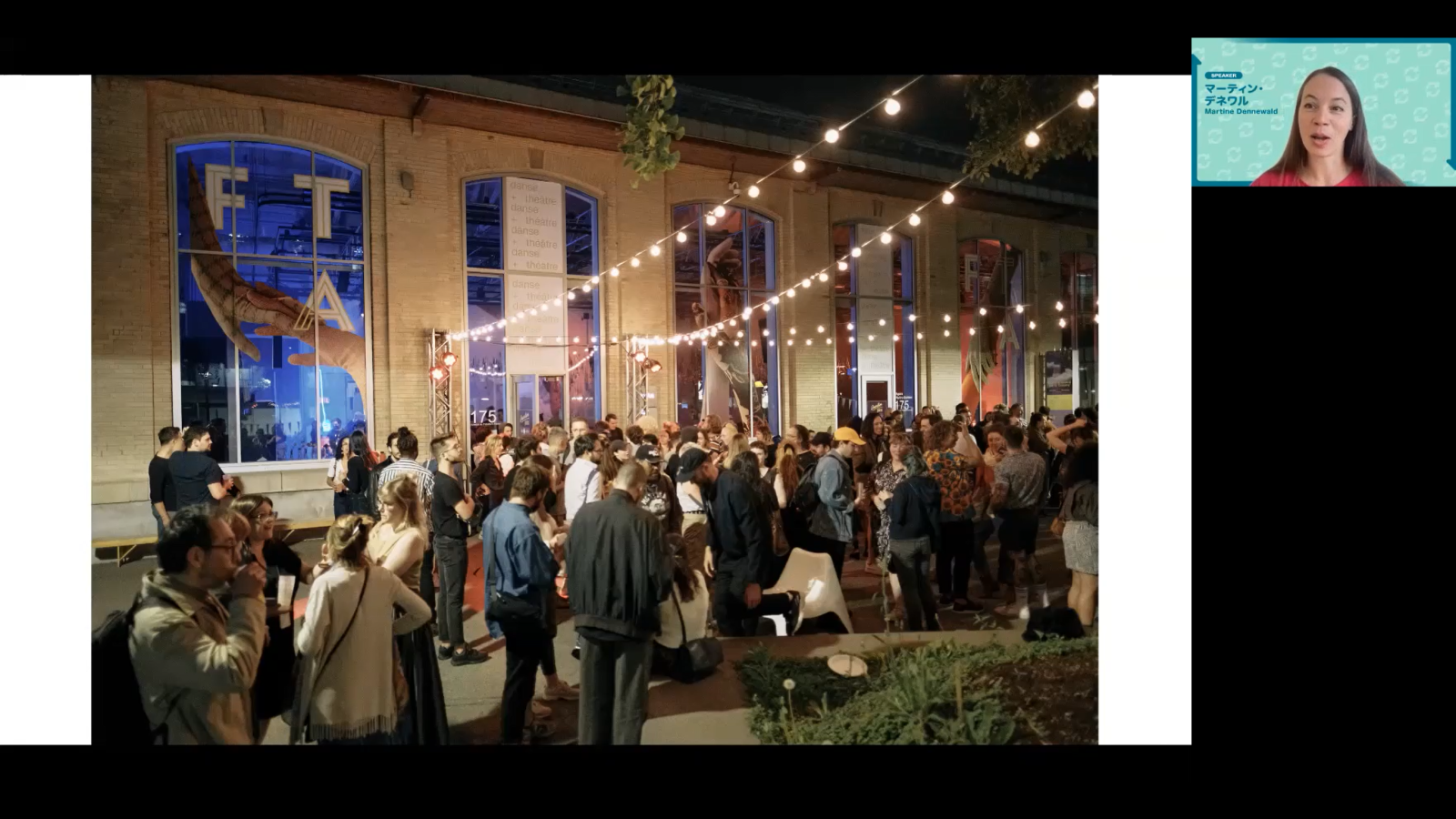
The final speaker was Natalie Hennedige, Festival Director of Singapore International Festival of Arts (SIFA). SIFA was founded in 1977 as the Singapore Festival of Arts, and it is a performing arts festival that includes works from diverse genres including theatre, dance, and music. Hennedige was originally appointed in 2019 to serve as the Festival Director from 2021-2023. She planned to start work in 2020, but the entire 2020 festival was canceled due to the Covid-19 pandemic. As a result, her term as Festival Director was pushed back a year, and she delivered her first festival this year, in 2022. Hennedige’s presentation gave a detailed overview of this year’s SIFA, paying special attention to the effect of the Covid-19 pandemic.
First, Hennedige discussed a number of works that were part of SIFA 2022’s Creation track. All of the performances she described were ambitious and featured an element of boundary-breaking, crossing not only the borders of artistic genre but also geographical and cultural borders. This included pieces like MEPAAN, a collaboration between the Singapore Chinese Orchestra and Tuyang Initiative that visually and sonically embodies the cultural landscape of Southeast Asia and its native people, and PROJECT SALOME, a work by Singaporean director Ong Keng Sen combining a documentary film by Berlin-based performance artist Michael(a) Daoud and a performance on social media by Singaporean actress Janice Koh. Next, she discussed SIFA 2022’s Life Profusion track, created to facilitate discovery and to leverage virtual venues for artistic expression. In addition to commissioning large-scale digital art pieces, this platform also provided resources and space to expand the ideas and discussion possibilities of the festival. While touching on the importance of exploring digital spaces, Hennedige concluded her presentation by emphasizing the need for those in the arts to be acutely aware of the world’s ever-shifting perspectives, suggesting that art must engage with those new perspectives through the unique language of art. (Although it was not discussed in detail during the presentation, in addition to Creation and Life Profusion, SIFA 2022 also has one more additional track, SIFA X, which provides a space to present “wilder performances.” This takes the form of a festival within a festival, and in 2022 it was helmed by the Singaporean company SAtheColective.)
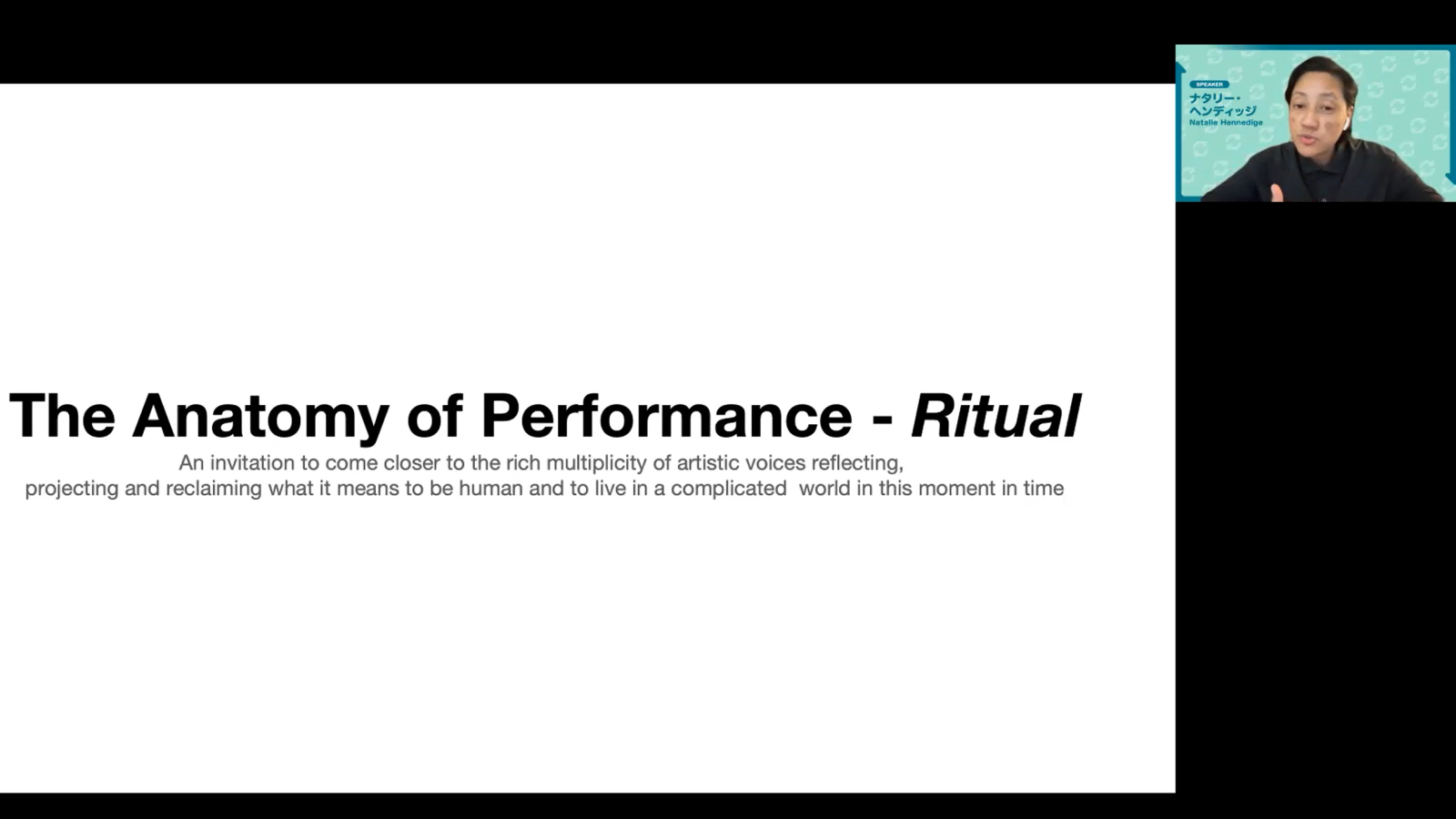
The second half of the symposium began with Kaku Nagashima (Co-Director of Tokyo Festival) delivering brief comments to all 3 panelists, followed by a free discussion using Nagashima’s comments as a jumping off point. There is not enough space to adequately summarize this wide-ranging discussion, which covered topics ranging from how to build networks (and the roles of in-person meetings and online communities); the relationship between festivals and local communities, or between artists from outside the community and local artists; the potential of digital platforms; and unlearning Western thought. However, it was a stimulating conversation full of numerous productive hints for future ideas and experiments.
As he brought the symposium to a close, Yokoyama expressed his belief that “one of the important tasks or privileges of performing arts is to be able to take time to meet people.” And it is certainly true that meeting people and traveling in order to do so is both a task and a risk, a source of both difficulty and possibility. Carrying with them an awareness of this duality and continuously reassessing its sustainability, performers will surely continue to travel.
Will Performers Continue to Travel? Rethinking the Environment and the Global South for International Performing Arts Festivals in a Post-Corona World
Series - How to Create a Sustainable Environment for Performing Arts
by Ása Richardsdóttir, Martine Dennewald, Natalie Hennedige, Yoshiji Yokoyama, Kaku Nagashima
Schedule:Stream scheduled from October 2022 until the end of Tokyo Festival 2022.
Venue:Online streaming
Language:English (with Japanese subtitles)




